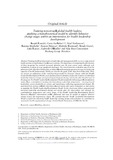| dc.contributor.author | Mashalla, Yohana | |
| dc.contributor.author | Daniels, Joseph | |
| dc.contributor.author | Farquhar, Carey | |
| dc.contributor.author | Nathanson, Neal | |
| dc.contributor.author | Petracca, Frances | |
| dc.contributor.author | Desmond, Michelle | |
| dc.contributor.author | Green, Wendy | |
| dc.contributor.author | Davies, Luke | |
| dc.contributor.author | O’Malley, Gabrielle | |
| dc.date.accessioned | 2016-06-29T12:16:49Z | |
| dc.date.available | 2016-06-29T12:16:49Z | |
| dc.date.issued | 2014 | |
| dc.identifier.citation | Daniels, J. et al (2014) Training tomorrow’s global health leaders: applying a transtheoretical model to identify behavior change stages within an intervention for health leadership development, Global Health Promotion, Vol 21, No. 4, pp. 24-34 | en_US |
| dc.identifier.issn | 1757-9759 | |
| dc.identifier.uri | http://hdl.handle.net/10311/1435 | |
| dc.description.abstract | Training health professionals in leadership and management skills is a key component of health systems strengthening in low-resource settings. The importance of evaluating the effectiveness of these programs has received increased attention over the past several years, although such evaluations continue to pose significant challenges. This article presents evaluation data from the pilot year of the Afya Bora Fellowship, an African-based training program to increase the leadership capacity of health professionals. Firstly, we describe the goals of the Afya Bora Fellowship. Then, we present an adaptation of the transtheoretical model for behavior change called the Health Leadership Development Model, as an analytical lens to identify and describe evidence of individual leadership behavior change among training participants during and shortly after the pilot year of the program. The Health Leadership Development Model includes the following: pre-contemplation (status quo), contemplation (testing and internalizing leadership), preparation – (moving toward leadership), action (leadership in action), and maintenance (effecting organizational change). We used data from surveys, in-depth interviews, journal entries and course evaluations as data points to populate the Health Leadership Development Model. In the short term, fellows demonstrated increased leadership development during and shortly after the intervention and reflected the contemplation, preparation and action stages of the Health Leadership Development Model. However, expanded interventions and/or additional time may be needed to support behavior change toward the maintenance stages. We conclude that the Health Leadership Development Model is useful for informing health leadership training design and evaluation to contribute to sustainable health organizational change. | en_US |
| dc.language.iso | en | en_US |
| dc.publisher | Sage publications//www.sage.com/ | en_US |
| dc.subject | Capacity-building | en_US |
| dc.subject | Education | en_US |
| dc.title | Training tomorrow’s global health leaders: applying a transtheoretical model to identify behavior change stages within an intervention for health leadership development | en_US |
| dc.type | Published Article | en_US |
| dc.link | www.ncbi.nlm.nih.gov/.../24763665 | en_US |

